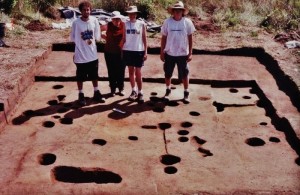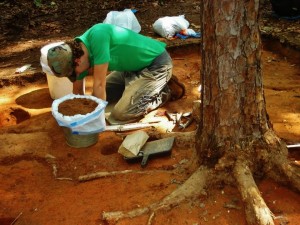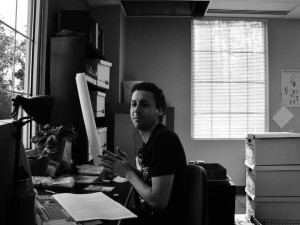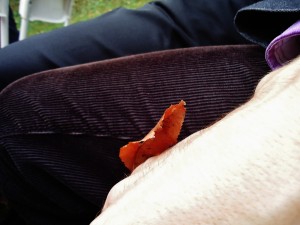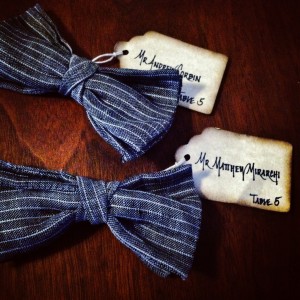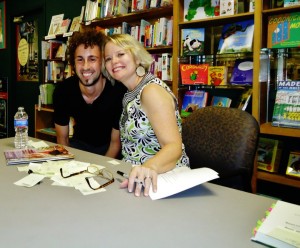As the progeny of a wildlife biologist and forester, my sister and I often had nontraditional childhood experiences that in no small way shaped our interests in, and love for, the outdoors. Being highly allergic to almost every blooming plant and grass, and hypersensitive to poison ivy, and prone to cancerous lesions from sun exposure and bouts of numbness from a defunct circulatory system make me the least likely candidate to be an outdoorsy person. Much less an archaeologist.
But here I am—lesions and all.
Okay, so I’m not a mass of boils. Still, you get my point. Genetically, I’m predisposed to a warm and cozy indoor office environment, not the exposure an archaeologist faces while traipsing through the wilderness, excavating archaeological sites.
***
Sure, being an archaeologist sounds romantically Thoreau-esque. But after bubbly poison ivy welts weep their itchy discharges down your arms like lava flows, barbed-wire fences rip through your pants and flesh, allegedly disconnected electric cattle fences jolt back to life as you climb them, leaky CamelBaks douse your backside with your only water source for miles, and dog-peter gnats nip at your ears, eyes, and face while cicadas scream from the July heat and humidity, you scoff at the idea that you ever thought this line of work was even remotely romantic.
That said, archaeologists either really have to love their work to keep with it or, early on, cynically resign themselves to their lot.
I’m of the latter ilk.
Granted, archaeology didn’t choose me. I chose it.
Mea maxima culpa.
***
From my field experiences, I found a month and two weeks to be the amount of time away from home-base I could stand without completely losing touch with reality. Returning to a motel room and eating cold canned soup and beans day after day for weeks on end instead of sitting down to a fresh salad in my Deco-decorated apartment got old really fast.
Even if the motel afforded me guilty pleasures like Project Runway and House Hunters.
In the field, sustained human contact was confined to the eight- to ten-hour workday, with the closest thing to after-hours carousing or bonding consisting of field cohorts yelling “Touchdown!” or “Homerun!” from neighboring rooms, and me screaming from my room at a misguided, pretentious fashion upstart, “Tulle and Paisley?! Too much pattern!” or oblivious first-time buyers, “House Two! Pick HOUSE Two, you fools!”
***
All too often, though, the hovel serving as my home-away-from-home became not a place of refuge after a long day shoveling dirt, hauling cobbles, and troweling profile walls, but the impetus for a frantic bar search.
And insult was added to injury when I found myself in a dry county, in the middle of nowhere, as I did on one particularly memorable excursion.
“Described as ‘homey’ and ‘comfortable,’ the motel seems to be just that: stone façade, barn-red metal roof. But I should know something’s amiss when I have to venture to the front of the house-office and enter a glass vestibule. The glass reflects the sunlight brilliantly, but prevents me from seeing inside. The only thing I make out is a small sign that reads “Ring Bell.”
But then a cloud bank passes overhead, and I find myself staring into the Zoo of the Future’s geriatric Homo sapiens sapiens exhibit.
An elderly woman sits in a wingback chair, the arms of which are covered with doilies. She peers ahead to a large television where Wheel of Fortune’s Pat Sajak grins widely. Near the back of the house, an elderly man shuffles with a plated sandwich—pimento cheese, no doubt —from the dining room to the kitchen.
And I just watch. Until I feel like some perverse voyeur.
Then, as any curious person would do, I ring the bell. A loud, long-lasting, arcane musical bellows from within, and the elderly woman rouses herself out of the chair, slowly turns toward the window, and approaches with a thin smile, out of which I can almost hear, It puts the lotion on its skin.
Once she gets to the front desk, she pushes out a bank teller drawer.
“Talk into the drawer. It’s the only way the sound can get through.”
Bending down, I yell into the drawer, and inform her I’m the first of my crew to arrive. She scans a large ledger on the counter.
“But, it’s Sunday.”
“Yes.” Pat, tell her what she’s won!
She seems surprised.
Flummoxed, I repeat my crew members’ names, that we have rooms reserved. We go back and forth until she gets it, and then asks me to fill out a registration card.
“There’s been a booking mistake. My husband took down the reservation.”
When I slip the card through the drawer, I clearly see my name printed in the ledger as “Marakey.” She pushes my room key back out.
Room 112 it is.
“It’s the one there on the end,” she says, pointing to the end unit facing the road.
I thank her, turn, and step into a mud hole. Auspicious signs abound.
I unload everything into a room overstuffed with mismatched eighties bedroom sets and decorated with fiercely disturbing wildlife paintings. My attention turns to the headboard, which features a Sharpie-scrawled, upside-down message: “J.C. loves B.B.” I can only imagine the sex act that facilitated it. And I wonder if they were at all disturbed by the stuffed wood duck staring down from above.
Waking up the next morning with a crick in my neck kicks off a quintessential first field day: we get lost; we get the truck stuck; we get drenched by rain.
Naturally, I return to find my room completely empty.
At first I think I have the wrong room. And then I think I cleaned my room that well and my stuff is just ordered in dresser drawers.
But, no.
Nothing is left. Except my groceries, which I’d tucked away in a TV cabinet.
Marvelous.
Panicked, I yell to the crew chief. He and I venture into the house-office’s vestibule to alert the owners and get some answers. This time, the elderly man sits at the front desk. He pushes the drawer out and I explain the situation.
But he’s not getting it.
“Yes, the man in Room 112 moved into Room 111 this morning.”
I tell him I’m the one in Room 112, that I still have my key, and that I didn’t known about the goddamn move. He gets flustered and says to check Room 111.
I think I must have one of those faces you can’t help but believing.
He walks over with me and opens up Room 111. All of my belongings are arranged in the exact places they’d been in Room 112. Even an upside-down cup on a paper towel had been moved between the rooms.
I shudder.
Barring the creepiness of the whole exchange, the room swap actually plays in my favor. The room is larger, less-cluttered, and doesn’t reek of mold.
Score!
***
But then we left for a week. Two weeks later, my luck wasn’t as good.
As evidenced by a few journal entries:
“I miss Room 111. Little did I realize how good I had it there. After emptying nearly an entire bottle of Febreze in this room, the mold and water stains are still laughing at me. With a gurgle of agreement, the toilet occasionally joins the other icky things in making even the most mundane task challenging.
“For instance, my shower experience was a nightmare. I cringed when I opened the door to the claustrophobic, mold-ridden shower which, incidentally, had a rusted light bulb-cord combination dangling from the unpainted plywood ceiling. I had no shower shoes, so I threw down a bath towel as a barrier between me and the shower floor funk. When I turned on the shower, only two jets sprayed—the rest of the holes must’ve been blocked, with what I don’t hazard to guess, nor want to know. I angled my body under both jets. But doing so caused me to knock into the soap-caked shower caddie. The whole caddie slipped down the showerhead’s neck, and the showerhead detached from the wall; it ripped open a small hole, out of which scurried a large silverfish that all but greeted me with, “Hello! Welcome to Hell!” When I jumped back to avoid my unexpected showermate, I smacked my ass into the nasty tile wall. I screamed.
“Now all I want to do is throw myself face-down onto the bed and bawl my eyes out with dramatic flair. But there’s a stained, heirloomed, floral piece-of-shit comforter that’s covering two stained sheets. Stains no doubt left by a Mr. Mayberry, the author of a sweet-nothing found etched into the nightstand’s inside drawer, no doubt with a shank: ‘Michelle. Love You. It Ben Fun. Mayberry.’
“Juxtaposed with the faux wood paneling, the comforter is supposed to make the room seem homey, but any semblance of hominess is dashed when a foreign pubic hair is found sticking out of one of the comforter’s brocaded rose blossoms. Mr. Mayberry’s, I presume? In order to fall asleep, I wear a toboggan, a down jacket over a fleece and an undershirt, and long sweatpants tucked into two pairs of calf-length socks. But all that doesn’t keep me from actually feeling things crawling on me throughout the night.
“And when it’s not creepy-crawlies keeping me on pins and needles–which are probably stashed between the mattress and box-springs–Bubbas keep racing up and down the alleyway outside my door, as if recreating a Dukes of Hazard episode. Four gunshots are interjected between the revving engines and squealing tires. Three in rapid succession; the fourth, no doubt, the finishing shot.
“When I wake up un-infested and bullet-free, I’m greeted by two slugs slowly sliming across the room’s water-stained, mildewed door. And, to top everything off, my body is keenly aware of my surroundings—I can almost hear my bowels rumble to me, ‘Like hell I’m letting you use that dripping, broken-down toilet, which was probably used to dispose of a fetus.’ Fuck. It. All.”
***
My contempt for Harrison Ford and his pack of lies has been mitigated slightly by capitalizing on my rather atypical job.
For one, it makes me seem butch.
Alright, fine. At least it’s a conversation starter.
“A who?”
“Ar-chae-o-lo-gist.”
“Say what?”
“Like Indiana Jones.”
“Ohhhh. So you dig up dinosaurs?”
“No, those are paleontologists. Have you even seen Raiders of the Lost Ark?”
“So, you don’t dig up dinosaurs?”
“No, dead peoples’ things mostly.”
“Do you at least wear a cool hat?”
“No. Mostly raggedy, stained clothes and boots.”
“And you go to school for this?”
So maybe it’s just a failed exercise. Still, the moniker gets people talking. Real archaeology means you’ll be hunched over your desk for hours, putting artifact tags into archival bags, or using a high-intensity magnifier to separate fish vertebrae from soil residue; all of that and then some, instead of wielding a golden statuette in one hand, whip in the other, and beautiful, buxom arm-candy clinging to your biceps.
I mean, the closest I’ve come to wielding a whip sensu Indiana was getting a riding crop to the nuts during an angsty teen fight with my sister. And she won.
But misconceptions about archaeology, and anthropology in general, are perpetuated for multiple reasons. Not the least of which is anthropologists’ inability to interact with people.
As professionals whose jobs hinge upon their abilities to engage people on a daily basis, anthropologists fail miserably. When it comes to social interaction, the rules we budding anthropologists are taught fly out the proverbial window during the most mundane salutation between professors and graduate students.
But I can see how it can be difficult for some professors to talk about anything other than themselves, how great and informative their work is for The Discipline, and the potential their work has to reform entrenched paradigms.
Seriously, though, guys and gals of the professorial persuasion, hear me.
Stop masturbating each other at the drop of a hat and realize that ninety-nine percent of what you say doesn’t resonate with your intended audience. Mostly because you’re too damn proud to take a few steps down from the Ivory Tower and make your subject-matter relevant for your undergraduates, much less for the general public.
***
But particular experiences did teach me one thing about interacting with academic anthropologists: mentally file professors’ non-academic interests under “Break Open in Case of Socially-Awkward Emergencies.”
This proved valuable on multiple occasions. Like when I was tasked to set up a departmental picnic and was stuck with two married, socially-inept professors an hour before the party.
Once I’d exhausted commentary regarding how great the food looked next to the hosts’ pot-bellied stove, I mentally scanned through the files I’d compiled for each of them.
“Is that a Fiestaware platter I see under that baklava?” I oozed, remembering that I shared a love of Fiestaware with the hostess.
And then we were off. Before I knew it, I’d gotten answers to the when, where, and why of her Fiestaware collection. Not wanting to completely exhaust the Fiestaware file just yet, I briefly recited my own Fiestaware’s lineage before turning to the host and asking about a particularly beautiful drugstore apothecary cabinet sitting in their living room.
And then we were on to antiques.
By the time we got to a story ending with “And so when he turned the loveseat on its side to get it through the door, the commode’s marble top fell out of the cushions and shattered to pieces,” people began trickling in and I bolted for the booze.
Usually, though, social situations involving two or more anthropologists rarely end that smoothly. Oftentimes, awkward silences last for minutes, inappropriate topics are broached to fill the silence. Or, as I once witnessed, a professor begins to shake like a Chihuahua who piddled on the family’s Persian rug.
All of these are cues to pack it in, cut your dialogical losses, and leave the bumbling bonobo of an interlocutor to hash out their neuroses in private.
***
But working outside the Ivory Tower didn’t shield me from awkward interactions. On many occasions I’d attempt to bond with my fellow shovel-bums.
I had little success.
Like when I thought it’d be a hit to sprint to the top of a steep hill, twirl around, and get a laugh out of my crew.
“I feel like Julie Andrews, like I could just break into song and collapse on the verdant hills!”
Silence.
“Well, er, I guess. If you feel like it.”
I’d missed the mark. Or my audience didn’t care.
Worse yet, they might not have ever seen The Sound of Music. But I found the last realization too troubling, and redirected my focus to the upcoming hills, full of cow-pies and horse flies.
And when I couldn’t rely on my fellow crew members to chat, jovial Bubbas, each of whom were positive they knew everything I didn’t, felt inclined to proffer said knowledge to me–the guy digging in the dirt.
Noticing us swatting at hoards of gnats hovering above a test unit, one such DOT worker imparted a pearl of wisdom.
“Ya know how to get rid of those gnats, don’tcha? Well, what ya do is reach back into your drawers, pick out a dingle-berry back there, wrap it up behind your head, and all the gnats will go to it and not yer face!”
By the time he’d uttered ‘behind your head,’ I’d thrown up a little in my mouth.
Twice.
***
Regardless of the constant trekking, intensive physical work, low pay, and nonexistent benefits, I got to see picturesque farms, rolling hills, and breathtaking views, and experienced warming sunrises and cooling breezes.
Scenery like that let me escape into myself, think about life and what I wanted. And while it turned out that what I wanted was nothing like what I was experiencing, I still counted that realization as revelatory.
Because with each revelation, each hurdle cleared, I was that much closer to figuring out what exactly it was that I wanted out of life.
And even if I fell, I could still dust myself off and try again.
Except when the hurdle happened to be an electrified cattle fence. Then, I’d just smiled through the pain.
Even if I straddled it.

